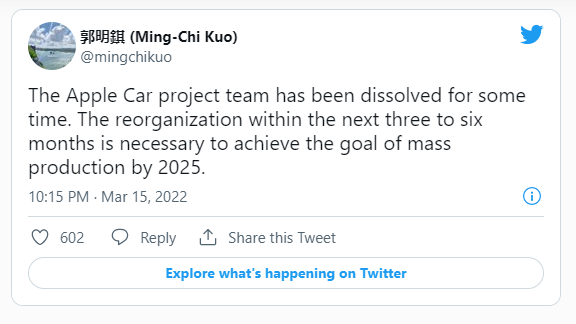1. Japan's 7.3 magnitude earthquake caused chip fab shutdowns
The 7.3 magnitude earthquake off the coast of Fukushima, Japan, on Wednesday 16 March led to shutdowns at manufacturing plants, including those used by chip and component makers.
Memory manufacturer Kioxia's K1 Fab in Kitakami was damaged, impacting its wafer supply. The K1 fab accounts for around eight percent of the company's 2022 production capacity.
A Fujitsu factory was damaged, requiring operations to be suspended as safety checks take place.
Ceramic capacitor supplier Murata has shut down operations at four factories. Two facilities are expected to be restarted March 18, while the other two will require more time. One, the factory in Tome in Miyagi prefecture, was damaged by a fire.
Renesas, which last year saw a chip fab get decimated by a fire, was also impacted by the earthquake.
The company operates a 300mm Naka Factory in Ibaraki Prefecture, the Takasaki Factory in Gunma Prefecture, and Yonezawa Factory in Yamagata Prefecture.
All three were suspended due to the earthquake, with Yonezawa the only one to partially return.
"Most of northeastern Japan is a production center for global upstream semiconductor raw materials," analyst group Trendforce said.
The semiconductor industry has struggled to meet demand, with a pronounced chip shortage exacerbated by black swan events.
In addition to the earthquake and earlier Renesas fire, the storm in Texas took out Samsung, NXP, and Infineon fabs; a fire tore through an ASML plant; power cuts and droughts impacted production in Taiwan; and a wayward balloon took out fabs in Germany. In January, earthquakes shut down two Toshiba chip fabs.
2. Quake-hit Japan plants restart but Toyota to suspend 18 assembly lines
Japanese manufacturers began restarting production at plants in the country's quake-hit northeast, but Toyota Motor Corp said it plans to idle 18 assembly lines for a few days next week due to a shortage of parts from suppliers.
On one hand, the limited damage caused by the magnitude 7.4 temblor has highlighted Japan's success in building resilience against the frequent tremors that shake the archipelago.
But the quake has sparked concerns of further disruptions to a pandemic-hit supply chain for precision components vital to electronics and autos production and in which Japanese manufacturers play a leading role.
Toyota, the world's largest automaker by sales volume, said it will idle the 18 lines at 11 domestic factories, mostly for three days.
It had suspended operations at three factories due to the quake and sees lost production of 20,000 units due to the stoppages. Toyota has already cut its global production target due to the ongoing chip shortage.
3. Tesla hikes China-made Model Y price again
Tesla raised the price for its cheapest Model Y car in China by 15,060 yuan ($2,372) on Thursday(Marth 17), following two consecutive price hikes for more expensive versions in just over a week.
The standard China-made Model Y now costs 316,900 yuan ($49,932), up from the previous 301,840 yuan ($47,559) on Tuesday, according to Tesla China official website. While the cheapest model had remained the same price since January, Tesla recently raised prices for the long-range and performance versions.
The performance Model Y has seen its price rise by 7.7% since January, with the long-range version up by 8% over that time. The price of the cheapest version has climbed by 5% with Thursday's increase.
The consecutive price hikes come as inflation has risen globally and a spike in Covid-19 cases in China disrupts business activity.
Tesla CEO Elon Musk recently warned that "Tesla & SpaceX are seeing significant recent inflation pressure in raw materials & logistics."
4. Apple Car Team Has “Been Dissolved for Some Time” Reveals Ming-Chi Kuo
In a tweet sent out earlier on 15th March, veteran Apple analyst Ming-Chi Kuo has revealed that Apple’s team of engineers working on the long-rumored electric vehicle has “been dissolved for some time”.
The analyst continued that the iPhone maker needs to reorganize the team as soon as possible for mass production of the so-called ‘Apple Car’ to begin by 2025.
In November last year, a Bloomberg report claimed that Apple was accelerating work on the project and was aiming to launch an electric vehicle with full self-driving capabilities by 2025.
But now, the expected ‘Apple Car’ release timeframe is likely to be pushed back due to ongoing development challenges.
5. GlobalWafers’ subsidiary in Italy to build new 12-inch wafer production line
Silicon wafer manufacturer GlobaWafers announced on March 16 that its subsidiary MEMC SPA in Italy will build a new 12-inch wafer production line and is expected to start production in the second half of 2023.
According to GlobalWafers, the new production line will focus on 12-inch polished and epitaxial wafers in line with European market trends. Together with the earlier 12-inch growth and capacity expansion plans, GlobalWafers will have a complete and highly integrated 12-inch production line in Italy.
In addition, GlobalWafers pointed out that in the future, the company is expected to implement a capital expenditure plan with a total scale of NT$100 billion (about $3.6 billion), which is mainly used to expand the production capacity of 12-inch wafers and compound semiconductors, including the expansion of new factories and the expansion of existing production capacity.
6. Samsung Electronics to Seek New Foundry Customers in China
March 16—Kyung Kye-hyun, the new co-CEO of Samsung Electronics, said that it will seek new foundry business customers in the Chinese market.
The global chip and component business grew more than the expected annual growth rate of 9%, and Samsung Electronics’ chip and component division is predicted to have a strong performance this year.
Samsung foresees high growth in the Chinese market and will actively seek new foundry customers in the country. It said it will improve supply capacity by improving factory operations.
At the same time, Samsung Electronics has not ruled out the possibility of withdrawing its business from Russia, where the company has suspended supplies and is closely monitoring the economic sanctions against Russia.

